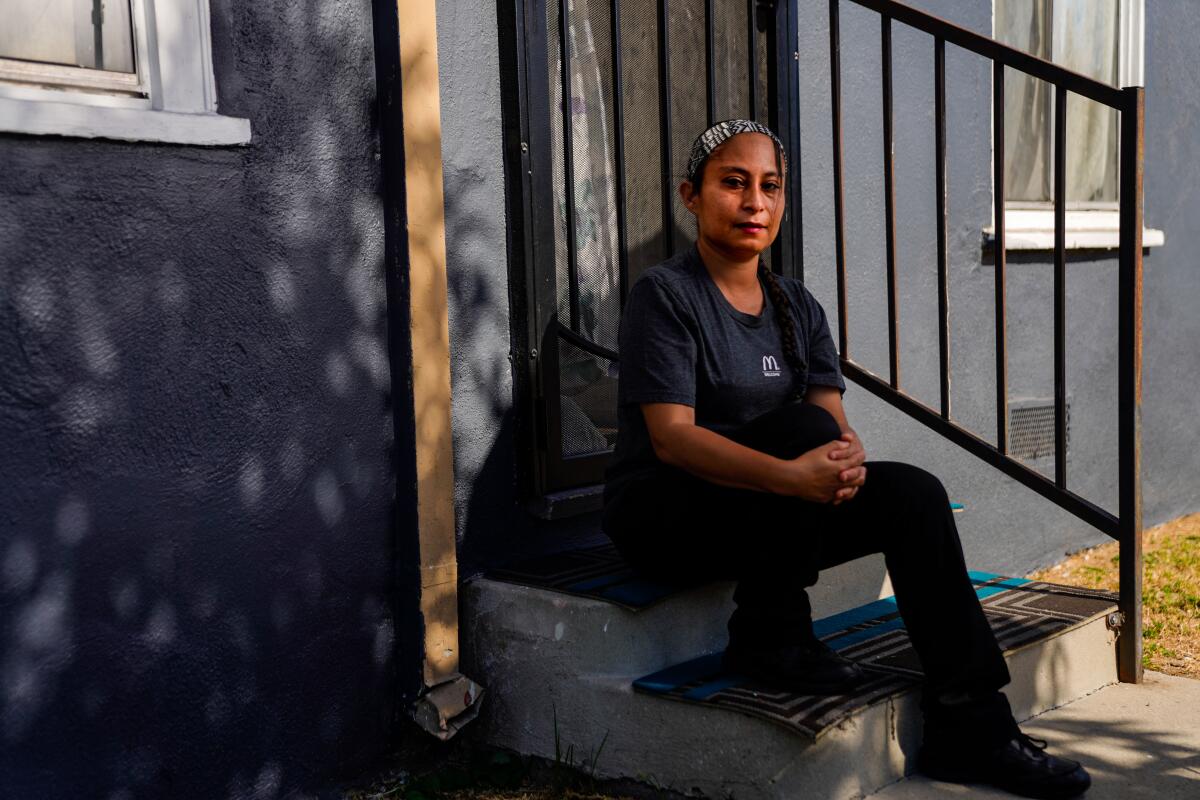State fines McDonald’s franchisee for firing workers voicing coronavirus safety concerns

The California Labor Commissioner has fined a McDonald’s franchisee for firing four employees who participated in strikes to protest coronavirus safety conditions in their Los Angeles workplace.
R&B Sanchez, which operates a McDonald’s on 1716 Marengo St. in Boyle Heights, was fined Friday more than $125,900 in lost wages and retaliation penalties and ordered to offer the workers their jobs back. The franchisee may appeal.
“Too many workers fear retaliation if they report a problem or stand up for their rights,” said Labor Commissioner Lilia García-Brower in a statement Wednesday. “California law has anti-retaliation protections in place that make it illegal for employers to punish workers for exercising their labor rights, such as reporting a workplace safety hazard”
According to the California Department of Industrial Relations, this is the second fine for coronavirus-related retaliation. The Labor Commissioner issued a citation in September in a case in which a worker was suspended for one day for wearing a mask.
In a statement, R&B Sanchez said it was reviewing the citations to determine how to proceed.
“We are disappointed to learn that a local labor agency has issued citations that do not reflect the truth of what is actually occurring in our restaurant,” it said. “We will continue to enforce the rigorous policies and practices we have in place to help protect crew and customer health and safety, and we will continue to work with the L.A. County Public Health Department to comply with applicable laws and public health guidance regarding COVID-19.”
During the pandemic, fear of retaliation has made many employees reluctant to voice safety concerns. Some are low-wage workers living in the country illegally, who don’t qualify for unemployment benefits. They worry that they might not find another job in the current economic climate if they are fired.
The labor commissioner’s Retaliation Complaint Investigation Unit has received 990 coronavirus-related retaliation claims, of which 465 assert health and safety issues. The unit strives to complete cases within a year, but that isn’t always possible — sometimes due to staffing issues, according to Amie Bergin, a senior deputy labor commissioner. It can be painstaking work reaching out to witnesses and trying to track down employers who have since closed.
Retaliation can include termination, a pay or hours cut, or a move to a less desirable shift. Workers alleging retaliation need only assert they had “a good-faith belief” that working conditions were unsafe, said Bergin.
According to the citations, between April and August 2020, the workers complained verbally to managers about health and safety conditions. In June and July, they joined strikes to protest inadequate precautions against the virus. Several also filed complaints with the L.A. County Department of Public Health and California’s Division of Occupational Safety and Health.
On Sept. 4, the workers were terminated for “job abandonment,” the state regulator said. It wrote that strike notices had been delivered to the franchisee, indicating that the workers intended to return to their jobs, and that the workers subsequently requested to do so.
Salomon Sanchez, who worked as a cook at the McDonald’s, told The Times that he went on strike partly because there wasn’t adequate social distancing in the kitchen, with “each person almost stuck to the other.” Workers, he said, also weren’t regularly given disposable gloves and he’d sometimes reuse them from one day to the next.
‘We had to make them last as long as possible,” he said.
Another worker, Lizzet Aguilar, said that in the spring, her manager dismissed concerns that she could be exposed to the virus from customers not wearing masks.
“She said, ‘look Lizzet, we’re not going to stop selling because of your concerns, we’ll sell to them whether they bring masks or not,’” Aguilar recalled.
After she was fired, Aguilar said she grew anxious about how she would pay her rent and support her 5-year-old son and husband, who didn’t have a steady job. She also worked two days a week at another McDonald’s, and began calling her manager there every day to see if they could use extra help — even if it meant working night shifts.
“It was really hard for me,” said Aguilar. “It affected me economically and psychologically.”
R&B Sanchez has previously told The Times that the business provides gloves and masks to employees on a daily basis, adheres to physical distancing guidelines and sanitizes regularly.
Tia Koonse, a legal and policy research manager at the UCLA Labor Center, said that it’s rare for the state to fine employers for retaliation and that the many months it typically takes to investigate complaints can discourage workers from voicing concerns.
“Retaliation cases are notoriously really, really difficult,” she said. “The workers know it’s going to take a very long time for their employer to be held accountable and to get reinstated.”
In October, the Board of Supervisors passed a motion directing the office of the County Counsel and the Department of Public Health to investigate the McDonald’s. It responded to a letter from Bob Schoonover, the president of the Service Employees International Union’s Local 721, that said the McDonald’s had fired four workers for going on strike to protest inadequate protections against the virus and held that the franchisee was “operating in noncompliance with even the most basic COVID-19 safety precautions.”
In a statement, Supervisor Hilda Solis, who wrote the motion, said the Department of Public Health found several minor violations that were “eventually addressed” but that the county found the issue of retaliation against employees to be outside its jurisdiction.
That has since changed. In November, county supervisors unanimously approved a program in which workers from certain sectors will form public health councils to help ensure that employers follow coronavirus safety guidelines. The program pairs councils in various industries with third-party organizations that will educate workers on health orders and help them report violations.
They also passed an ordinance to prohibit retaliation for belonging to the public health councils or for reporting public health violations, making violators liable to a fine and aggrieved workers eligible to bring an action in court.
More to Read
Sign up for Essential California
The most important California stories and recommendations in your inbox every morning.
You may occasionally receive promotional content from the Los Angeles Times.











